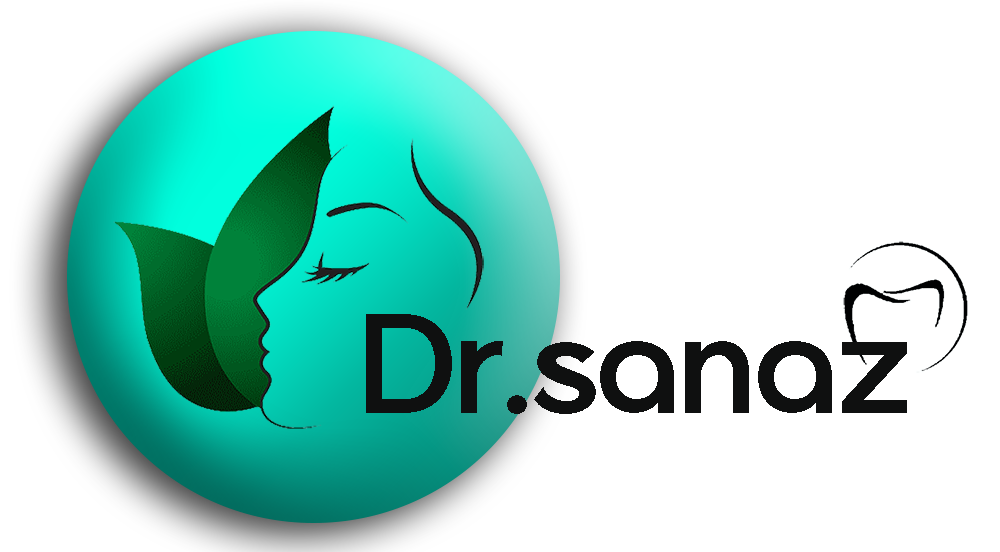
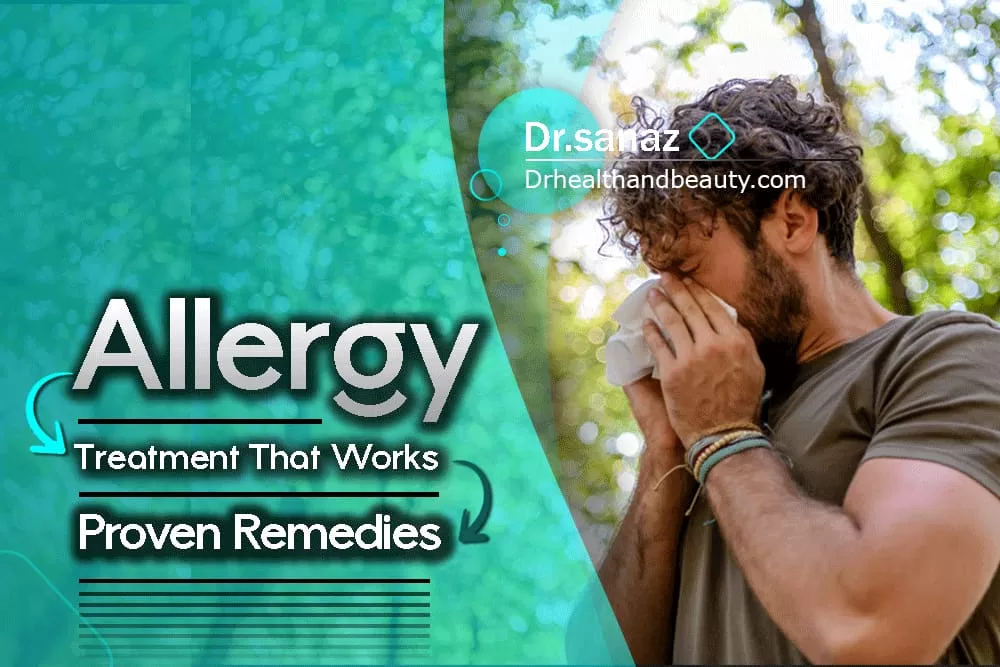
The Allergy Treatment That Works / Proven Remedies
Table of Contents
Allergy treatment depends on what you are allergic to. Therefore, before doing anything, remember that other people’s prescriptions may not be suitable for your allergy treatment, and on the contrary, they may aggravate your allergy symptoms.
Since the cause of allergy is different in each patient, as we mentioned, your treatment depends on what causes the symptoms.
Your GP can often advise you on managing your allergy symptoms.
Allergy is the reaction of the immune system of the body. It happens when the immune system wrongly identifies a substance that is usually harmless to the body as a harmful substance and acts against it.
The human body usually defends itself against harmful factors such as viruses and bacteria. However, this defense is sometimes against harmless substances like dust, molds, or plant pollen.
The body’s immune system reacts against these substances and makes many antibodies.
The antibody attacks them like a weapon to destroy them. Each antibody is made for a particular substance and is specific to the substance that causes the allergy. Ingredients that lead to an allergic reaction are called allergens.
In defense, chemical inflammatory mediators, such as histamine and other substances secreted by white blood cells, cause unpleasant symptoms.
People prone to allergies experience these symptoms and need allergy treatment.

Allergy signs and symptoms
You probably know people around you who get a runny nose, sneeze, or cough with the change of season or exposure to certain substances, and their eyes seem watery. You have experienced such a situation. We know such reactions as allergies or sensitivities.
- Nasal congestion and congestion, sneezing, itchy nose, discharge from the nose, itchy ears or the roof of the mouth
- Inflammation of the conjunctiva of the eye, which makes the eyes look red and moist and sometimes discharge and itch
- Skin inflammations, where areas of the skin become dry, red and itchy
- Pudding, itchy skin lesions
- Contact inflammation of the skin occurs due to contact with the substance, causing irritation and itching.
- Asthma, which is difficulty in breathing, occurs in the form of shortness of breath, cough, and wheezing.
Allergy is a common disease that occurs in different severity in each person. Usually, most allergy treatments are not definitive, but some solutions reduce the severity of this disease.

What happens in allergic reactions?
First, a person receives the allergen by inhaling, swallowing, or exposing himself to it through the skin. After a person is exposed to an allergenic substance, A series of events occur for allergic reactions:
- The body starts to produce a particular type of antibody called IgE when the allergen binds to the body’s cells.
- The antibody binds to a type of blood cell known as a mast cell. Mast cells are located in the airways, the intestines, and elsewhere in the body.
- The existence of mast cells in the airways and the digestive tract makes these cells more exposed to allergens.
- The allergen binds to IgE present in mast cells. This causes the mast cells to release various chemicals into the blood.
- Among these substances, histamine is the primary chemical substance. Many of the symptoms of an allergic reaction originate from this substance.
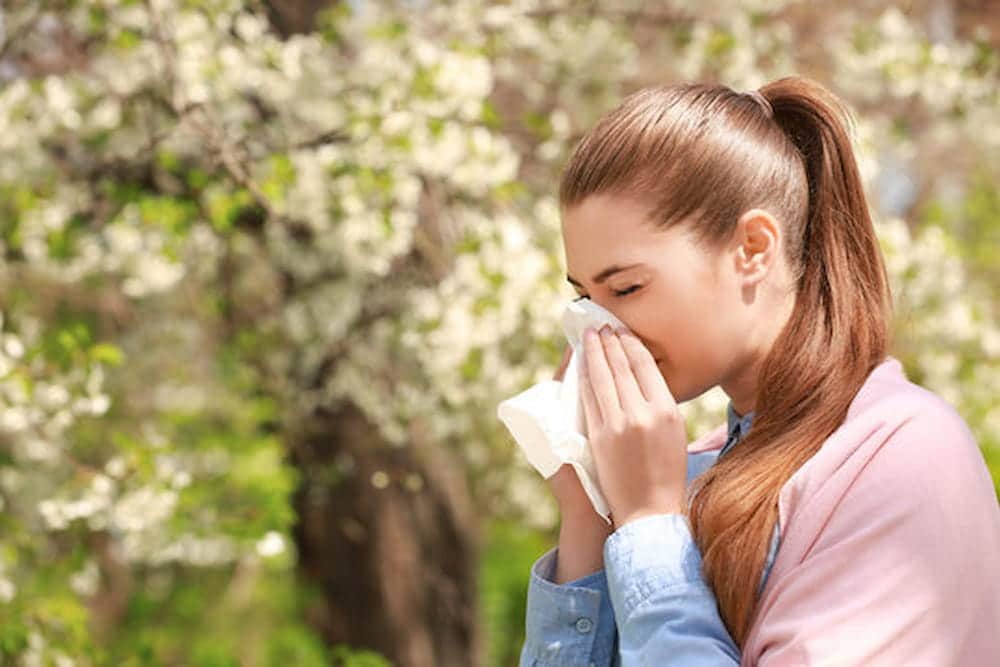
What is the cause of allergies?
An allergic reaction can happen in any part of the body, such as the skin, eyes, stomach wall, nose, sinuses, throat, and lungs. Immune cells are located in these parts to fight against aggressive agents that enter through inhalation or ingestion or come in contact with the skin.
The reaction of immune cells against the allergen leads to symptoms. Our body defends itself against factors such as viruses and bacteria.
However, sometimes, it mistakenly recognizes harmless substances such as plant pollen as harmful agents and shows a defensive reaction against them.
In such a situation, the body’s immune system produces an antibody against the allergen.
This process causes the person to experience annoying symptoms. Symptoms that we call allergy symptoms.
What are the types of allergies?
Substances that stimulate the body’s immune system and cause an allergic reaction are called allergens. These substances are usually harmless, and the body’s immune system does not take action against them. However, if the immune system goes wrong and produces antibodies, it causes an allergy in a person.
Allergies are classified according to the type of allergen.
Types of allergies or sensitivities:
- plant pollen
- molds
- Animal proteins, oil, and animal excrement
- feather of birds
- Cockroaches and their excrement
- Allergies to food
- Allergy to insects or insect bites
- Respiratory allergies such as allergy or sensitivity to particles in the air such as flower pollen or animal dander
- Allergy to drugs such as penicillin
- Allergy to chemicals
.
Most foreign substances enter the body through breathing or swallowing. Our body’s immune cells are also located in such places to fight against invading agents more efficiently.
The exciting thing is that the sensitivity symptoms appear more in these parts.

Recommendations for Control and Allergy Treatment
Avoid exposure to allergens.
The best way to control allergy symptoms is often to avoid what you are allergic to, although this is not always practical. For example, you may be able to help manage symptoms by:
- Control food allergies carefully in what you eat
- Control animal allergies by keeping pets outside and washing them regularly
- Control mold and mildew allergies by keeping your home dry and well-ventilated
- Control hay fever (seasonal allergies) by staying indoors and away from lawns and gardens with high amounts of pollen.
- Control allergy to mites and dust by using hypoallergenic duvets and pillows
- Control carpet allergies by installing wood flooring.
.
Get help from allergy medications.
Over-the-counter mild allergy medications are available from pharmacies for allergy treatment.
Always ask a pharmacist or GP for tips before starting any new medicine, as it may only suit some. The following can be mentioned among the pharmaceutical products that can help you control and treat allergies.
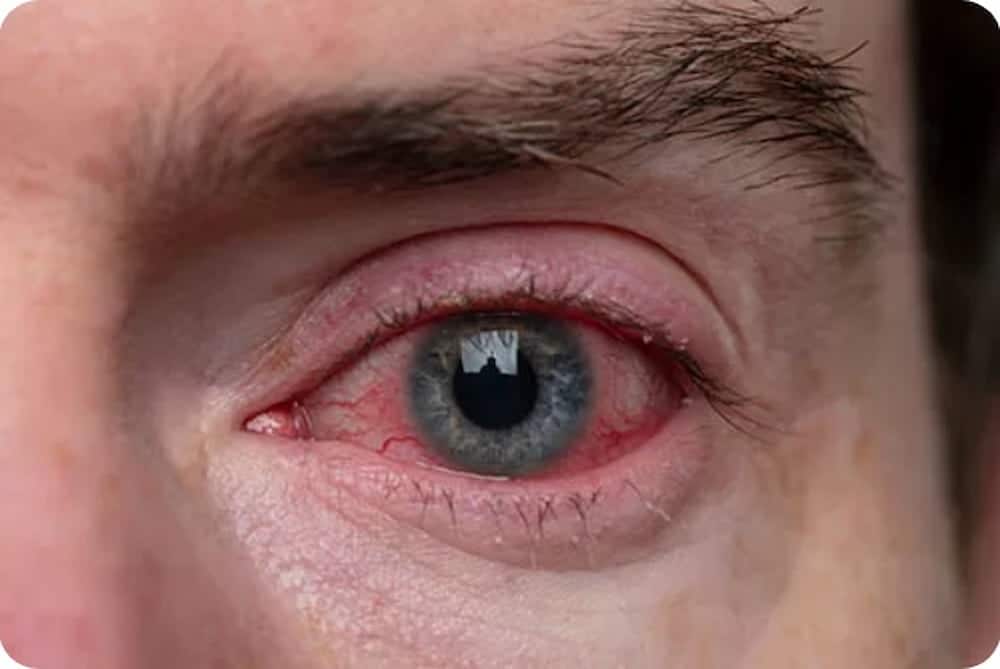
Antihistamines and allergy treatment
Antihistamines are the primary drugs for allergy treatment. You can use antihistamines when you notice the symptoms of a severe allergic reaction.
Also, if you have allergies, you can use it to prevent allergic reactions.
For example, if you have hay fever and know the number of pollens is higher on a particular day, it is better to take it at the beginning and early morning hours.
Related: “What Is The Difference Between Intermittent, Remittent, And Relapsing Fever?“
Antihistamines can be taken as tablets, creams, liquids, capsules, eye drops, or nasal sprays.
An antihistamine is recommended depending on which part of your body is affected by the allergy.
Decongestants for allergy treatment
Decongestants can be used as a short-term cure for nasal congestion caused by an allergic reaction.
They can be prescribed as tablets, nasal sprays, capsules, or liquids. Decongestants should not be used for more than a week, as long-term use can worsen your symptoms.
Lotions and creams
Red and itchy skin from an allergic reaction can be treated sometimes with over-the-counter creams and lotions, like:
- Moisturizers or emollients that help keep the skin moist
- Skin protection cream against allergens
- Calamine lotion to reduce itching
- Steroids to reduce skin inflammation

Steroid drugs and allergy treatment
Steroid medications can help decrease inflammation caused by an allergic reaction. They will be available as follows:
- Nasal spray and eye drops for inflamed nose and eyes
- Cream for eczema and contact dermatitis
- Tablets for the treatment and control of hives
- Inhaled medicines for asthma
- Weak steroid sprays, drops, and creams are available without a prescription. Stronger creams, inhalers, and pills are available with a prescription.
Immunotherapy or desensitization to treat allergies
Immunotherapy may be a good option for the few people with severe and persistent allergies who cannot control their symptoms using the above measures.
Over several years, immunotherapy treatment involves occasional injections of small doses of the allergen, either as drops or sublingual tablets.
The injection can only be done in a specialized clinic under the supervision of a doctor because sometimes the patient may have a severe reaction after the injection.
Drops or tablets can usually be taken at home. The goal of treatment is to help your body get used to the allergens so that you do not have a severe reaction to them.
This treatment will not necessarily cure your allergy but will make it milder, meaning you can take less medicine.

Treatment of severe allergy or anaphylaxis
Individuals with severe allergies may have life-threatening reactions called anaphylaxis or anaphylactic shock.
If you are at risk, you will be given special injectors containing a medicine called adrenaline for emergency use.
If symptoms of anaphylaxis occur, such as difficulty breathing, you should inject adrenaline into the outer thigh before seeking emergency help.
How to prevent allergic reactions?
Identify your allergens. Common environmental allergens are:
- Animal dander
- Dust
- Pollen of plants and flowers
- Keeping animals and plants at home
- Eliminate or control allergens
- Once identified, you must control or eliminate the allergen.
.
Animal dander
If you have a pet, avoid letting it into the bedroom. Take your dog or cat out of the bedroom to avoid trapping allergens inside the bedroom. When buying furniture, prefer leather over fabric.
Dust mites
Use hypoallergenic bed covers and wash your sheets weekly in hot water.
pollen
Keep your windows closed and use the air conditioner indoors. Also, drive with closed car windows to prevent pollen from entering the vehicle.
You can install high-efficiency particulate filters in the air conditioning system or a panel filter on the air conditioner.
treatment of Allergy with cough
Doctors usually prescribe medicine for allergy treatment of cough. Antihistamines are among the effective drugs that can help relieve coughs caused by allergies.
If you do not want to be sleepy during the day, talk to your doctor about this, as antihistamines are sleep-inducing.

Home remedies for cough caused by allergies
In addition to drug treatments, you can take the following measures to reduce and treat an allergic cough at home:
Avoid being in environments with industrial fumes as much as possible.
Drink more fluids throughout the day. Drinking water causes plant pollen and other allergens to leave the body at the same time as the body is hydrated.
Stop smoking so that the nose and throat inflammation does not get worse.
Keep the air in the house humid so your throat does not become dry and coughs do not intensify.
Combine the amount of honey and warm water and drink. This combination is effective in relieving cough caused by allergens.
Permanent allergy treatment
Permanent allergy treatment is impossible because it is impossible to fight against all types of allergens for allergy treatment and complete elimination of allergies.
However, you can become almost immune to allergens and prevent allergies by following a few tips.
Take a shower
When outside, dust and plant pollen significantly settle on your clothes, shoes, and hair. Always shower and change clothes after coming home to remove any potential allergens.

Use a mask
When you must be in areas with allergens, use an N95 respirator.
The N95 mask traps about 95% of small particles, including pollen, and does not allow them to enter the respiratory system.
Eat healthy foods
Eating healthy foods is the biggest favor you can do for allergy treatment during an allergy outbreak.
Try to add fresh vegetables and fruit to each meal. Studies have shown that children who eat plenty of fresh vegetables, fruits, and nuts have fewer allergy symptoms.
There is no clear evidence that foods can help prevent allergies, but trying does not hurt.
At least by following a healthy diet, your body will be safer, and you will have allergic reactions later.
Hydrate your body
If your nose feels stuffy or runny, drink more water, juice, or soft drinks. Warm liquids like broth, tea, or soup can give you some relief.
- Do not use harsh chemicals.
- Use natural cleansers instead of harsh chemicals to prevent symptoms from worsening.
- Use a steam inhaler
- Inhale the steam to relieve nasal congestion and make breathing easier
- Avoid smoke (such as cigarette smoke).
- Try acupuncture
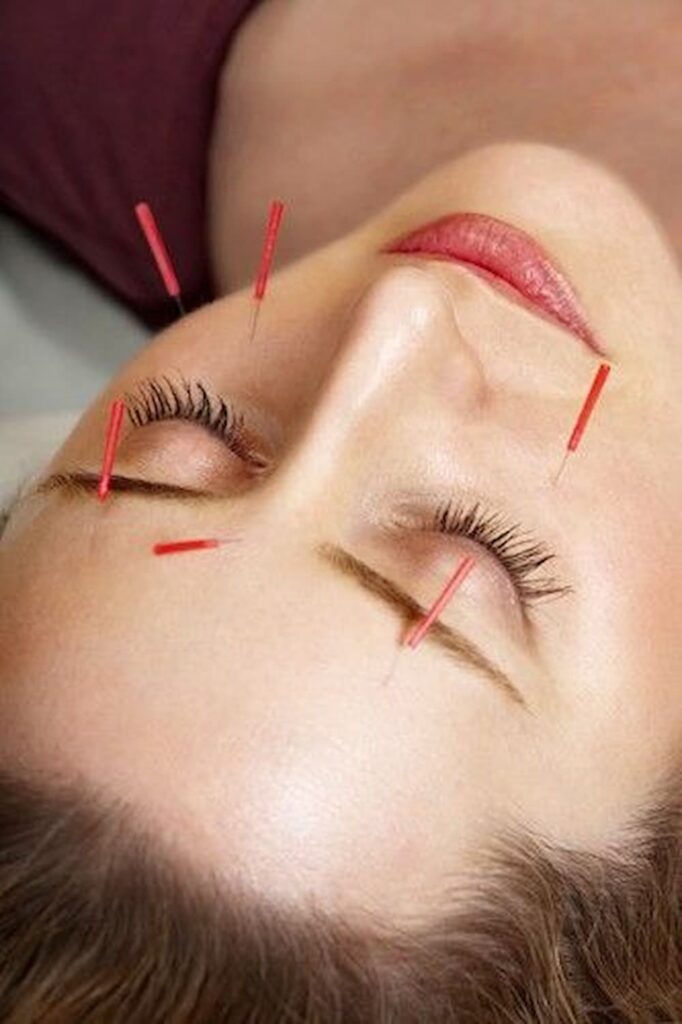
Allergy treatment and home treatment of rhinestone allergy
If the cause of your allergy is crystals, the doctor will use the following treatment methods after diagnosing the type of allergy:
- Betamethasone ointment
- antihistamine
- Clobetasol ointment
- Cetirizine
- Lidocaine ointment
- Menthol ointment
- Antibiotic drugs
- Promethazine
Be careful not to take these drugs arbitrarily; a doctor must examine you. The doctor may prescribe a test to accurately diagnose the cause of the allergy, which you should do before taking the medication.
Treatment of allergies and eyelid sensitivity
The best thing for allergy treatment of eyelid allergy is to stay away from the allergen. To be able to fix this problem faster, it is necessary to stop wearing makeup until your eyes are completely healed.
Use a cold compress to reduce eye inflammation and swelling. Allergy treatment also exists in pharmaceutical form to treat eyelid allergy.
Doctors usually prescribe the following medications to relieve eyelid sensitivity:
- Diphenhydramine
- Hydroxyzine
- Promethazine
- Hydrocortisone ointment
Sometimes, doctors prescribe antihistamines and artificial tears to treat and relieve eyelid sensitivity.
If the sensitivity of the eyelid is severe, taking a mild steroid medicine can help. If the eye allergy becomes infected, the doctor also prescribes antibiotics.

Cetirizine anti-allergic tablet
Cetirizine is one of the most widely used and effective drugs for treating runny nose. This drug is a type of antihistamine and acts as an anti-allergen.
This medicine can eliminate allergic symptoms such as sneezing, itchy skin, hives, itchy eyes and nose, watery eyes and runny nose.
In addition to tablets, Cetirizine is also produced and supplied in other forms, such as syrup and soft gel capsules.
According to your doctor’s diagnosis, you can use one of these items for allergy treatment.
However, usually, the doctor prescribes a pill sample to relieve symptoms caused by allergies.
Anti-allergic skin pill
As mentioned above, skin sensitivity is part of the symptoms associated with allergens.
Some people experience skin sensitivity, skin itching, redness and even hives in contact with allergens.
The doctor will prescribe anti-itching and soothing medicines if you suffer from skin allergies with common symptoms such as itching.
Among the effective allergy treatment drugs for the relief and treatment of skin allergies, the following can be mentioned:
- Loratadine
- Cetirizine
- Fexofenadine
Medicines for the treatment of allergy and nasal congestion
Nasal congestion is another symptom of allergy, which is very common. We see runny nose and nasal congestion, mostly in sensitivities related to spring and autumn.
Most allergy doctors prescribe the following drugs to relieve and treat nasal congestion:
- Oxymetazoline
- Pseudoephedrine
- Phenylephrine
If the nose is inflamed, the doctor will probably prescribe another medicine. Usually, the doctor prescribes corticosteroid drugs to reduce nasal inflammation caused by allergies.
Which doctor should we see for allergy treatment?
For allergy treatment, it is necessary to see an allergy specialist. Of course, in many cases, a general practitioner can also help you control and treat allergies.
In some cases of allergy, the general practitioner can advise and treat the disease.
GPs can advise you on how to avoid exposure to the substance you are allergic to.
Also, the doctor can help you control allergy symptoms by prescribing medicine and medical advice.

Conclusion
Allergy is the immune system’s reaction against substances that are harmless and do not pose a risk to the body; these substances can be pollen or a type of food called an allergen.
The cause of allergies in the body of most people is rooted in heredity.
Allergies are different; each person’s body may react to a specific substance. To treat allergies, we must first know the type of allergen the immune system recognizes as foreign to find the proper allergy treatment.
It is better for this. Let us go to the doctor so that, if necessary, he can prescribe special tests to identify the allergen or put a suitable allergy treatment method in front of us.
References:
Share in :
Explore more

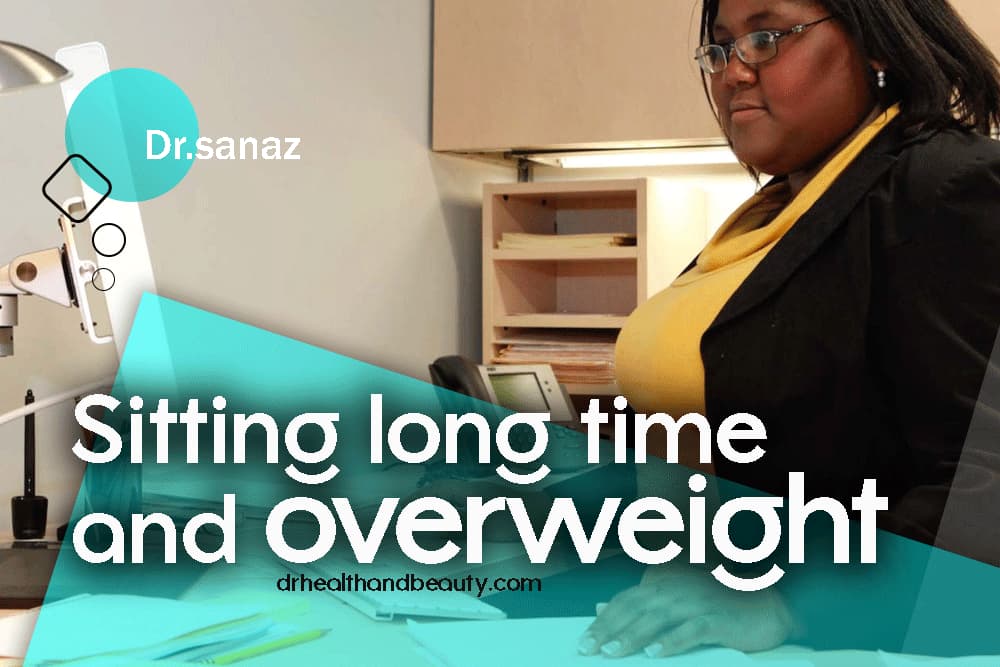
Sitting A Long Time And Being Overweight- Drhealthandbeauty

